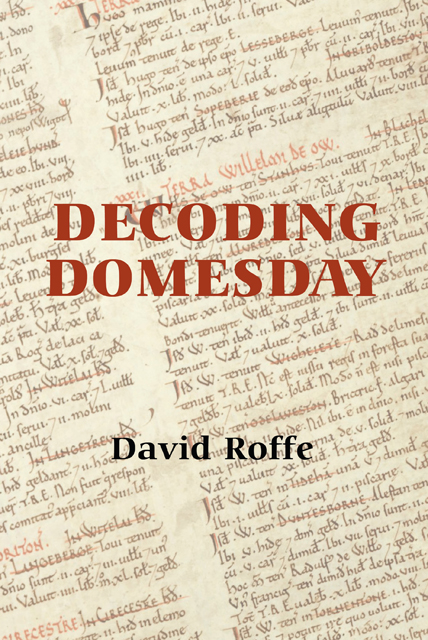Book contents
- Frontmatter
- Contents
- Tables
- Dedication
- Preface
- Acknowledgements
- Abbreviations
- 1 Domesday Past and Present
- 2 The Domesday Texts
- 3 The Inquest and the Book
- 4 The Domesday Boroughs
- 5 Lordship, Land, and Service
- 6 The Vill and Taxation
- 7 The Economy and Society
- 8 The Communities of the Shire
- 9 The Beyond of Domesday
- 10 Domesday Now
- Appendix The main entry forms of GDB
- Bibliography
- Index
3 - The Inquest and the Book
Published online by Cambridge University Press: 10 March 2023
- Frontmatter
- Contents
- Tables
- Dedication
- Preface
- Acknowledgements
- Abbreviations
- 1 Domesday Past and Present
- 2 The Domesday Texts
- 3 The Inquest and the Book
- 4 The Domesday Boroughs
- 5 Lordship, Land, and Service
- 6 The Vill and Taxation
- 7 The Economy and Society
- 8 The Communities of the Shire
- 9 The Beyond of Domesday
- 10 Domesday Now
- Appendix The main entry forms of GDB
- Bibliography
- Index
Summary
Domesday Bookwas clearly abbreviated from the documentation of the Domesday inquest, but it is another matter to claim that inquest and book were conceived of as an integrated process. There is nothing in the texts themselves that necessarily demands such a conclusion. It is as well, then, first to consider what an inquest of the Domesday type was and what sorts of records it commonly produced. This is easier said than done. In the last fifty years or so it has become increasingly clear that the inquest was not a Norman importation. Something like the jury of presentment is attested in the late tenth-century Danelaw and it is highly likely that there was a similar institution elsewhere in England. Nevertheless, Domesday is the first extensive document of its kind that survives. If there was anything vaguely comparable before the Conquest we have no idea of its form. By necessity, we have to look to the twelfth century and later. From that time with a quickening pace the general inquest became an integral part of the governance of England until it was superseded by parliament in the fourteenth century. In consequence there survives a large body of material, from simplepresentments, through compiled verdicts, to abstracts and abbreviations. What emerges as striking from this vast corpus is the central role that the verdict of the hundred played. The jurors whose names are recorded at the top of each roll and whose seals were appended to the bottom spoke for the community at large. However, they did not take it upon themselves to interpret its concerns. The presentments of individuals and vills were sought and then incorporated into their verdicts: it is clear from those that survive that these verdicts were compilations drawn up before the formal court sessions. Thereafter, abstracts and abbreviations might be compiled from these sources, but they never superseded them. The point is nicely made in a note on the flysheet of the Book of Fees, apparently written when that work was compiled from a series of thirteenth-century inquest records in 1302: ‘Remember that this book was composed and compiled from several official inquests … and therefore the contents of this book are to be used for evidence here in the Exchequer and not for the record’.
- Type
- Chapter
- Information
- Decoding Domesday , pp. 62 - 108Publisher: Boydell & BrewerPrint publication year: 2015



